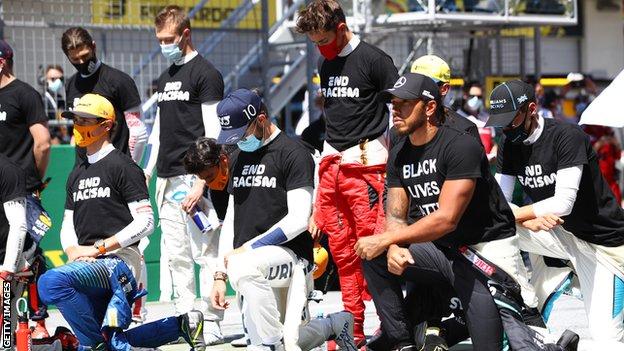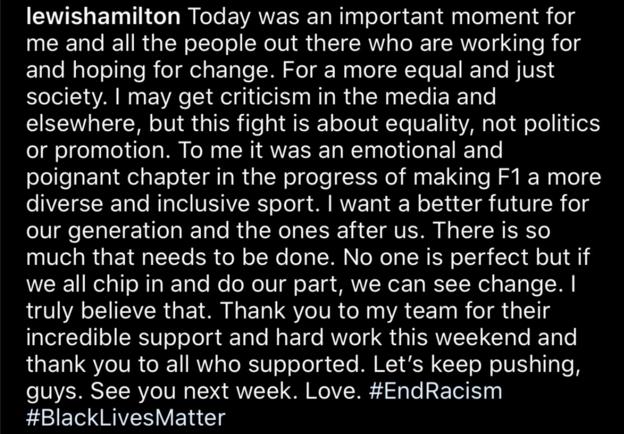
Lewis Hamilton says whether Formula 1 drivers take the knee is a minor issue in the context of the fight against racism across the world.
Six of the 20 drivers did not join Hamilton in going down on one knee when F1 held a moment’s silence to support anti-racism before the Austrian GP.
Hamilton said: “It’s still a really powerful message but whether or not you kneel is not going to change the world.
“It’s a bigger issue across the world than something as little as that.”
Ferrari’s Charles Leclerc and Red Bull’s Max Verstappen were among the six who chose not to – and other drivers had privately expressed concerns about the political connotations of the gesture in some countries.
Leclerc said before the race: “I believe what matters are facts and behaviours in our daily life rather than formal gestures that could be seen as controversial in some countries.
“I will not take the knee but this does not mean at all that I am less committed than others in the fight against racism.”
The F1 drivers issued a collective statement through the Grand Prix Drivers’ Association on Saturday saying they were united against racism and prejudice and in support of diversity.
The issue was discussed at a meeting of the GPDA on Friday and Hamilton emphasised after finishing fourth in the season-opening race on Sunday that he had “never requested or demanded anyone to take the knee” and that “nobody should be forced into a scenario where they have to kneel”.
“I never even brought it up,” he said. “It was brought up by F1 and the GPDA. When we did the drivers’ briefing, Seb (Vettel) and (Romain) Grosjean both brought it up and asked the drivers whether or not they would do it and there were several that said they wouldn’t.
“And I let everyone say what they wanted to say and I opened up to them and I said I will be doing it but you do what you feel is right and I’m really grateful for those who did kneel along with me.
“Everyone had the right to their own personal choice and that was what I felt was right to do.”

The gesture originated in the NFL with Colin Kaepernick, who knelt during the playing of the US national anthem to call attention to issues surrounding racial equality and police brutality.
It has since been adopted during the global protests against racism sparked by the death in police custody of unarmed African-American man George Floyd in May.
Hamilton said he had spoken to Kaepernick on the topic a couple of years ago and had intended to race at the US Grand Prix with a helmet reflecting his support.
“I had a helmet and everything made in red with his number on the top,” Hamilton said. “But back then I was kind of silenced and told: ‘Back down and don’t support it’, which I would say I regret.”
Hamilton did not expand, but a source close to him has told BBC Sport that his decision not to race in the helmet in Austin, Texas, was based on advice that if he did so he might have problems with US immigration on entering the country, where he spends a lot of time.
Hamilton’s Mercedes team have changed the colour of their cars from silver to black this year to signal their support for anti-racism and diversity and F1 and governing body the FIA have launched a drive to increase equality across motorsport.
Hamilton said he considered it important to continue to push the message.
“Whether that’s taking the knee, I don’t know whether there will be opportunities to do that,” he said. “I definitely don’t want to do it on national anthems.
“But I would say definitely in the background I will continue to try to improve my education and hopefully encourage others. I don’t want it to be the case of people feeling forced. I want people to feel excited to be a part of the change.”
He also addressed the confusion between the slogan “Black Lives Matter”, which he wore on a T-shirt before the race, and the political organisation of the same name which has caused controversy over the last week with tweets about Palestine and defunding the police.
Hamilton said: “Certain people are making it more political than it is and then there is UK Black Lives Matter that has spoken some more political issues.
“But the people at rallies and the people out there marching are fighting for one cause and that’s for equality. It is not a political thing for them.
“When I wear the shirt, that is what I am supporting. I am not necessarily supporting the political movement. That is something completely different so it is important to try to keep them separate.”
